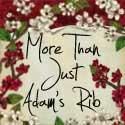Over the past few years, books such as David Platt's Radical, Francis Chan's Crazy Love, and Katie Davis' Kisses From Katie have encouraged American Christians to abandon the secure life and take up the cross daily by intentionally engaging with God to impact His world.
These are lessons I have taken to heart but haven't merely left there. Instead, for the past year, I have been seeking to sacrifice more of myself in practice through weekly ministry.But what do you do when God says step aside? And what's more, what if you don't really want to?
It was January of this year when I felt God's call to join with a sister church in teaching English as a second language to a group of Burmese refugees. By March, I was madly in love with the group people I saw for two hours each week, those men, women, and children from Mexico, Yemen, Myanmar, Ethiopia, and Rwanda.
Teaching English to non-native speakers is not something I have ever been trained to do. It's still not something I would say I know how to do. Each week before class, I felt totally incapable.
Yet, standing in front of the group, I would literally feel the Spirit empower me, an indwelling of strength and confidence that I had never before experienced in other ministries. I finally understood Paul's statement about being naturally unskilled in speech but fully capable through the Holy Spirit (2 Cor. 11:6). In my inability came His ability.
One evening after an hour-long drive back home, I told husband I could see myself doing this for the rest of my life. Towards the end of the first 8-week semester, I fully planned to just keep teaching.
Then, through a series of God-incidences, it became clear that I was to take off the next 8-weeks. When new sisters and brothers in Christ stepped up to fill my role as teacher, I joined in helping them plan "what next," but did as I felt God was asking me to do and stepped aside.
Standing before the now-precious names and faces that last Thursday night in early April, I felt chest-pain grief at leaving, knowing that with immigrants' transient nature, I may never see any of them again. The night ended with me kneeling to give a dark-skinned Cabbage Patch doll to a little girl I had grown to love like my own daughter. Her smile lit up the night.
On Tuesday, classes started up again, this time without me as teacher.
I awoke early Wednesday morning to a note in my inbox telling me
how class had gone, who returned, how happy the students were to be back, and a surprise--another sister in Christ had come with one of the women I had drawn into the ministry with me. And now, this new woman was as starry-eyed as we all have been, immediately hooked.
In that moment, I saw confirmation of why God had asked me to step back for the moment. While I love to serve my God and to feel the blessings rain down on me as a gift for my obedient service, I am learning that holding too tightly to what I could easily label as "my job" would deny others the blessing they would receive in a chance to minister, too.
A ministry cannot be about me and you. It cannot exist solely because of me and you. True ministry seeks to deny self by involving others, submitting to glorify God versus glorifying self.
Had I not taken a turn on the sidelines, my disobedience would have denied others the blessing, would have taken away someone else's opportunity to show her love for Christ in sacrifice.
To serve Him in action is beautiful and much needed. But, to serve Him by stepping aside is just as meaningful to a kingdom where all must work together for the glory of God.

























